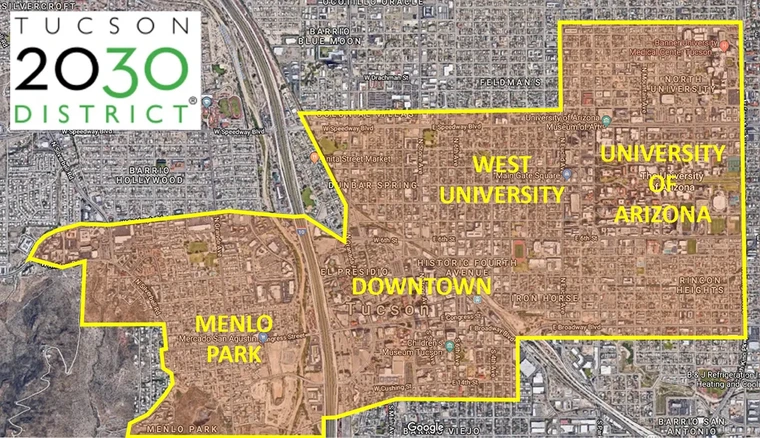UArizona Joins Tucson 2030 District
The Tucson 2030 District is composed of many local stakeholders, including non-profits and industry partners.
Tucson 2030 District
In 2018, the Office of Sustainability, in collaboration with Planning, Design, & Construction and Facilities Management, and alongside the City of Tucson, Pima County and more than 28 local businesses, formalized the University’s participation in the Tucson 2030 District. 2030 Districts are innovative models for urban sustainability that consist of collaborations between the public, private, and non-profit sectors in 22 metropolitan areas throughout the United States and Canada. Each District defines a geographic boundary within their respective community, and sets a goal to achieve 50% reductions in building energy use, water consumption, and greenhouse gas emissions stemming from the transportation sector within that District’s boundary by the year 2030, over mid-2000s baselines drawn from the Commercial Buildings Energy Consumption Survey (CEBCS). Each District is led by the private sector, and develops a unique, place-based shared vision for sustainability and economic growth in its locality, while transitioning to a lower greenhouse gas footprint.
In joining the Tucson 2030 District, the University has made an unprecedented commitment to elevate its role in climate change mitigation and climate resilience throughout the Tucson and Southern Arizona communities. For these efforts, the University of Arizona received a ChangeMaker “Visionary” Award in April 2019, as did our partners at the City of Tucson and Pima County.

The Tucson 2030 District includes more than 25 million square feet of committed space, and encompasses the University’s main campus, as well as much of the vibrant downtown area of Tucson. Projects underway include conducting energy assessments and benchmarking of all buildings in the District, offering guidance and training to business owners, incorporating various software tools to streamline data collection practices, leveraging collective buying and bargaining power to maximize efficient use of resources, and building a rich social network of environmentally motivated, influential stakeholders. The District is also focused specifically on helping Tucson property owners increase the value of their assets while reducing operating costs, and creating an overall healthier and more sustainable community.
